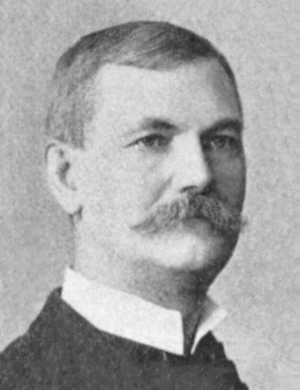Henry Lee Morey facts for kids
Quick facts for kids
Henry Lee Morey
|
|
|---|---|
 |
|
| Member of the U.S. House of Representatives from Ohio |
|
| In office March 4, 1881 – June 20, 1884 |
|
| Preceded by | John A. McMahon |
| Succeeded by | James E. Campbell |
| Constituency | 3rd district (1881-1883) 7th district (1883-1884) |
| In office March 4, 1889 – March 3, 1891 |
|
| Preceded by | James E. Campbell |
| Succeeded by | William E. Haynes |
| Constituency | 7th district |
| Personal details | |
| Born | April 8, 1841 Butler County, Ohio, US |
| Died | December 29, 1902 (aged 61) Hamilton, Ohio, US |
| Resting place | Greenwood Cemetery (Hamilton, Ohio) |
| Political party | Republican |
| Spouses | Mary M. Campbell Ella R. Campbell |
| Alma mater | Miami University |
| Military service | |
| Allegiance | |
| Branch/service | |
| Years of service | 1861–1865 |
| Rank | |
| Unit | |
Henry Lee Morey (born April 8, 1841 – died December 29, 1902) was a brave officer in the United States Army during the American Civil War. After the war, he became a politician and served as a U.S. Congressman for Ohio.
Henry Morey's Early Life and Family
Henry L. Morey was born in Milford Township, near Collinsville, Ohio, in Butler County, Ohio. His parents were William and Derexa Morey. His family had a history of serving the country, with his great-grandfather and grandfather fighting in the American Revolutionary War.
Henry's father, William Morey, used to make hats. On trips to New Orleans, he saw how terrible slavery was. Because of this, he became a strong abolitionist, meaning he worked to end slavery. William even used his home in Ohio as a safe place for people escaping slavery, as part of the Underground Railroad. He was known as a friend to Black people.
Henry went to local public schools and the Morning Sun Academy. He then studied at Miami University in Oxford, Ohio.
Henry Morey's Civil War Service
Right after Fort Sumter was attacked (which started the Civil War), Henry left college. He joined the University Rifles, a group connected to the 20th Ohio Infantry. He served for three months in West Virginia under General Robert C. Schenck.
After that, Henry joined the 75th Ohio Volunteer Infantry for three years. He served under several generals, including Franz Sigel in Virginia and John Pope and Quincy A. Gillmore in Florida and during the siege of Charleston. Henry was promoted several times, becoming a corporal, then a sergeant, then a second lieutenant, a first lieutenant, and finally a captain. Three of his brothers, Oliver, Joseph, and James, also fought for the Union Army.
Henry took part in many battles, including Monterey, Franklin, Battle of McDowell, Strasburg, Battle of Cross Keys, Battle of Cedar Mountain, and the Second Battle of Bull Run in Virginia. He was captured during the Battle of Chancellorsville and held in Libby Prison until he was exchanged. He then returned to command his company in battles like Fort Wagner and Fort Gregg in South Carolina, and Battle of Gainesville in Florida. He left the army in 1865.
On April 25, 1865, Henry married Mary M. Campbell, whose father was an Ohio state senator.
Henry Morey's Post-War Career
After the war, Henry Morey studied law and graduated from Indianapolis Law School in 1867. He became a lawyer in Ohio and started a law firm in Hamilton, Ohio, with one of his six brothers. Sadly, his first wife, Mary, passed away on July 1, 1867. On February 26, 1873, he married Ella R. Campbell, who was Mary's sister.
Henry was elected as a Republican to serve two terms as the city's lawyer (called a solicitor) in Hamilton from 1871 to 1875. He was also elected as the main lawyer for Butler County, Ohio (called a prosecuting attorney) in 1873, serving both jobs at the same time. In 1875, he ran for the Ohio Senate but did not win. Henry L. Morey also attended the Republican National Convention in 1876.
In 1880, he was elected as a Republican to the U.S. House of Representatives for Ohio's third district. In 1882, after the population count changed the districts, he ran in Ohio's seventh district and served in Congress until June 20, 1884. Another politician, James E. Campbell, successfully argued that he should have won the election, and took Henry's seat on June 21, 1884. Henry was also a delegate to the Republican National Convention in 1884. In 1888, Henry was elected again to Congress from Ohio's seventh district. However, he lost his reelection bid in 1890.
After his last term in Congress, Henry Morey continued to practice law in Hamilton. He was also a member of several community groups, including the Masons, the Odd Fellows, the Knights of Pythias, and the Royal Arcanum. He passed away in 1902 and was buried in Greenwood Cemetery.
Henry L. Morey was a cousin of James Whitcomb, who was a governor and later a U.S. Senator for Indiana.
 | Dorothy Vaughan |
 | Charles Henry Turner |
 | Hildrus Poindexter |
 | Henry Cecil McBay |

